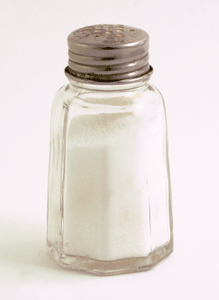WebMD wrote a very interesting article on its website discussing the problem our country has with consuming too much salt/sodium in our diets. The Center of Disease Control found that 70 percent of Americans are consuming 2.3 times the healthy amount of salt on a daily basis.
Why is this bad?
A high sodium diet is associated with high blood pressure, heart disease, and stroke, which sadly can lead to death.
How does this happen?
When you eat salt, your blood pressure increases. When you consistently consume high amounts of salt, your blood pressure remains high and dramatically increases your risk of stroke and heart disease.
The shocking news.
A major contributor to this increase in salt consumption is not due to sprinkling salt from the shaker (obviously this adds to it), but studies show that most salt from our diet is from processed and manufactured foods. Examples include tomato sauce, soups, condiments, canned foods, prepared mixes, etc. Other contributors of high-sodium chemicals in our diet are baking soda, baking powder, and MSG (others on food labels/ingredient list include disodium phosphate, sodium alginate, sodium benzoate, etc.).
The American Heart Association (AHA) recommends healthy American adults should eat less than 2,300 milligrams of sodium a day. This is about 1 teaspoon of sodium chloride (table salt). To illustrate, the following are sources of sodium in the diet.
- 1/4 teaspoon salt = 575 mg sodium
- 1/2 teaspoon salt = 1,150 mg sodium
- 3/4 teaspoon salt = 1,725 mg sodium
- 1 teaspoon salt = 2,300 mg sodium
- 1 teaspoon baking soda = 1000 mg sodium
The good news.
The good news is we can break this salt consuming trend. You need to do two things: 1) severely reduce the amount of processed foods you consume and 2) retrain your taste buds so you become more salt sensitive. Remember, you don’t need to go crazy and completely cut salt from your diet. Work on making small, gradual reductions, which will be virtually unrecognizable and can help you accomplish your salt-reducing goal with no change in the tastefulness of foods.
How do I reduce salt in my diet?
The AHA recommends the following:
- Choose fresh, frozen or canned food items without added salts.
- Select unsalted nuts or seeds, dried beans, peas and lentils.
- Limit the amount of salty snacks you eat, like chips and pretzels.
- Avoid adding salt and canned vegetables to homemade dishes.
- Select unsalted, fat-free broths, bouillons or soups.
- Select fat-free or low-fat milk, low-sodium, low-fat cheeses, as well as low-fat yogurt.
- Specify what you want and how you want it prepared when dining out. Ask for your dish to be prepared without salt.
- Use spices and herbs to enhance the taste of your food.
(Via WebMD)
